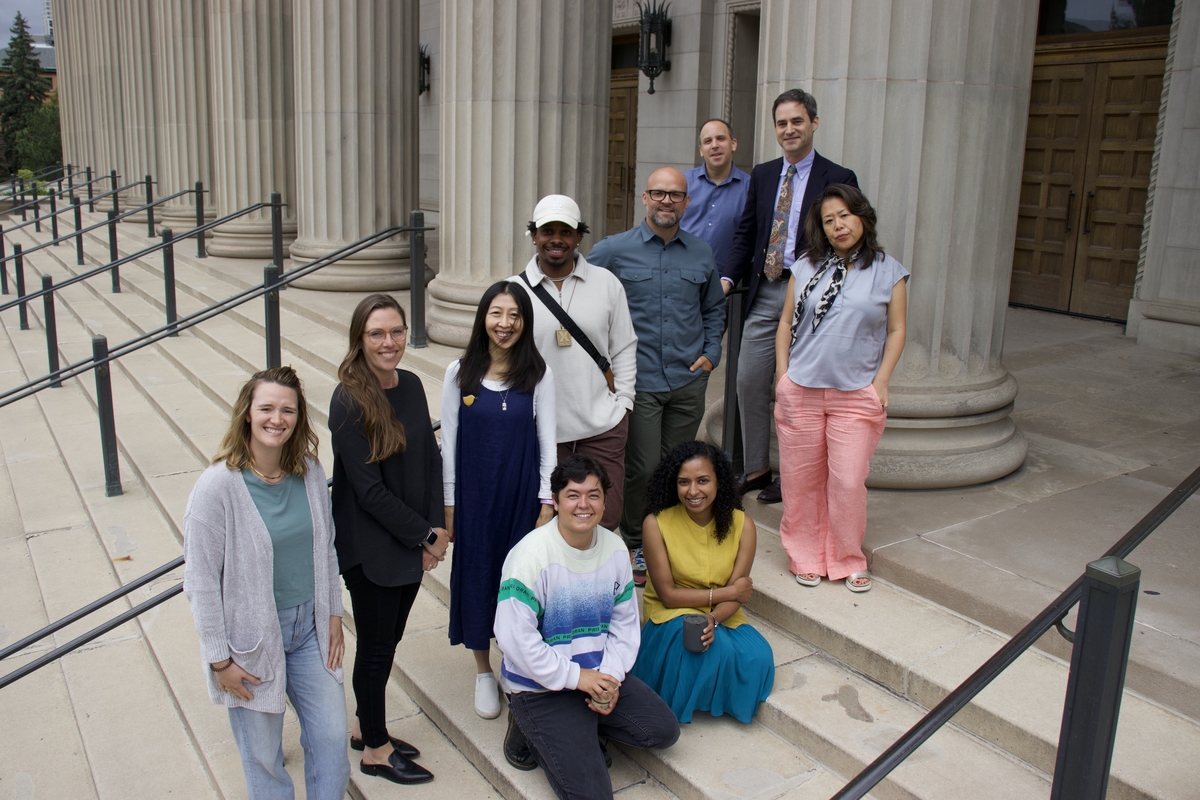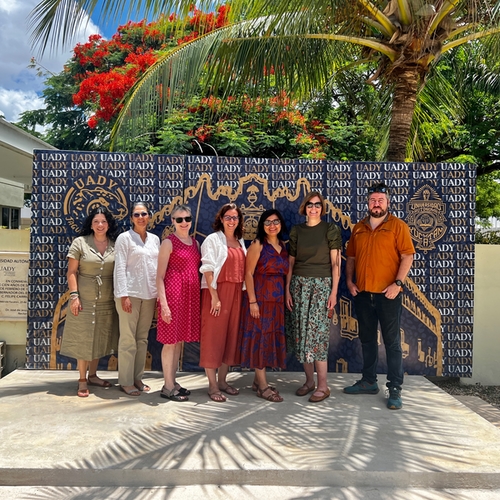September 12, 2023
Bianet Castellanos shares updates on IAS programmatic activities, including continued investments in community engagement and advocating for racial and social justice.
Recent cuts in university programs across the nation have been concentrated in the humanities, sparking heated debates over a field in crisis. This past summer, the IAS participated in two projects that underscored the critical value of humanities research and teaching to a world facing daunting economic, political, and climatic changes.
In June, several IAS staff members—Susannah Smith, Juliet Burba, Carolina Gustafson, and I—traveled to Mexico’s Yucatan Peninsula to meet with potential collaborators about organizing a Global Humanities Institute on Indigeneity, tourism, and ecological crises. Funded with the support of the Consortium of Humanities Centers and Institutes Membership Activity Fund grant, we met with faculty at the Universidad Autonóma de Yucatán and the organizers of Co’ox Mayab, a cooperative made up of twelve Maya communities that promotes community-based tourism. Our goal is to develop an institute that centers Indigenous peoples’ experiences with tourism, climate change, and mega-development projects. Relying on humanities tools like archival research, storytelling, exhibits, and other media will provide opportunities for Maya communities to share their concerns and issues with a global audience.
In July, graduate students from across the nation participated in the Humanities Without Walls (HWW) Career Diversity Workshop, which I co-organized with the CLA Liberal Arts Engagement Hub, the College of Liberal Arts, and the HWW team. The purpose of the workshop was to provide these students with information about jobs beyond the academy. Guest panelists convened to discuss the value of bringing a humanities lens to the tech, publishing, nonprofit, and government sectors. Two of my former students and HWW alumni, Sarah Atwood and Robert Smith III, spoke of how their training in race, gender, and American studies were foundational for the work they now do, respectively, as a researcher and advocate of deliberative democracy, and as a program manager “harnessing the radical imagination of artists and culture workers in the service of racial justice.” It was a wonderful event that pinpointed the great value in having innovative humanities-trained scholars hold leadership positions in a wide variety of fields and job sectors.
Both examples remind us of the importance of placing the humanities in conversation with social science and STEM fields, and the urgent need to ensure that the humanities are well funded. As an interdisciplinary center, the IAS is fortunate to be able to nurture a community of wonderful scholars working at the intersections of multiple fields whose work helps us better understand the pressing issues of our time. This fall, we welcome yet another cohort of interdisciplinary faculty and doctoral fellows working across the sciences, arts, humanities, and design. We look forward to seeing how their projects develop as a result of spending time learning from one another.

We are also excited to announce two new research opportunities. We have relaunched the IAS 5x5 Working Groups program this year, which will be organized around six themes: broader impacts, just housing, speculative democracies, going viral, digital self-determination, and the global Midwest. This program is intended to provide opportunities for faculty, students, staff, and community members to engage with these topics in creative, inventive, and low-stakes ways. We have also formalized a process the IAS has long offered: helping develop ideas into fundable projects. We are very excited to offer the IAS Call for Concepts—watch for the announcement. This program, which will operate on a rolling deadline, will welcome pitches for any idea, no matter how preliminary. Please also pay attention to the upcoming deadlines for our Residential Fellowships and Research and Creative Collaborative program.
This fall, Open Rivers will publish our 24th issue, this one titled “Layers.” The articles speak to layers of history, layered ways of knowing places, geological layers, geographic layers, and even affective and emotional layers. We will also be releasing a new call for submissions focused on myriad formulations and permutations of Water & Rights. We are seeking content that addresses questions of social and environmental justice embedded in spaces where water and rights are complex, contested, and changing.
Finally, we are excited to launch a two-year public event series titled (In)Justice, which explores different visions for what justice might look like. Featuring community leaders, artists, and scholars, events will span book banning and facism in America, abolition, Indigenous data sovereignty, trans rights, the U.S.-Mexico border, and much more. Join us this week for our first event of the semester, which celebrates the 50th anniversary of Hip Hop. Explore our calendar to make sure you don’t miss an event! We look forward to seeing you soon.
Welcome back!
Bianet Castellanos
♦
